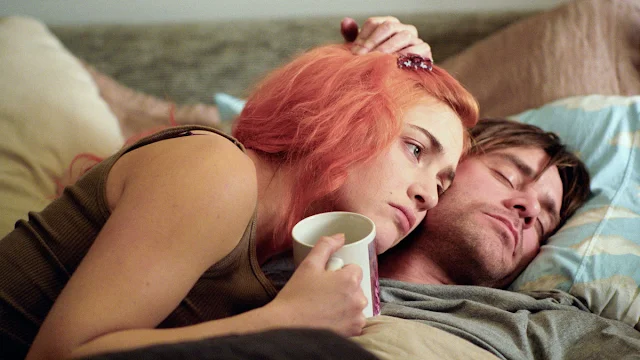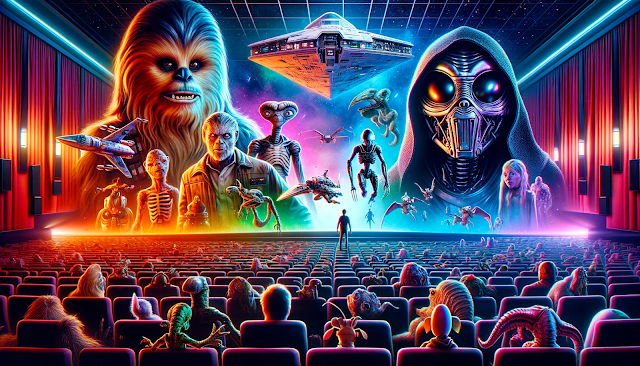The 55 Best Science Fiction Films
What is it that makes a sci-fi film a classic of the genre? A dystopian story where the unlikely hero survives the desperate trials of toxic wasteland? Humanities' last hope sees off an intergalactic threat with its last starfighter? An evil emperor is defeated after light is returned to the universe? All this and more is what makes for great science fiction cinema.
How did we choose the films on this list? We gave weight to critical appeal, viewer love, re-watch ability & cult status. We're totally mindful that this list has our own personal bias and there's a recency factor here too. We reckon we could make another list and have 55 different films as well... oh hey there Dune...
So, to each Sci-Fi fan, their own.
The Astromech's Top 55 Science Fiction Films
1. The Andromeda Strain (1971)Director: Robert Wise
This film adeptly captures the intensity and urgency of a scientific crisis. Based on Michael Crichton's novel, it portrays a team of scientists racing against time to understand and contain a deadly extraterrestrial microorganism. The film is a cerebral sci-fi thriller, emphasizing procedural scientific analysis and ethical dilemmas rather than action or spectacle. The movie's production design, particularly the depiction of scientific procedures and laboratory settings, was highly praised for its attention to detail and realism.
2. RoboCop (1987)Director: Paul Verhoeven
 "RoboCop" combines biting satire with gritty action, presenting a dystopian future where a critically injured policeman is transformed into a cybernetic law enforcement officer. The film explores themes of identity, corporate corruption, and humanity's relationship with technology. Its blend of graphic violence and dark humor creates a unique and thought-provoking viewing experience. The film's influence extends beyond cinema into pop culture, and its portrayal of issues such as surveillance and corporatization has become increasingly relevant. Your move, creep indeed.
"RoboCop" combines biting satire with gritty action, presenting a dystopian future where a critically injured policeman is transformed into a cybernetic law enforcement officer. The film explores themes of identity, corporate corruption, and humanity's relationship with technology. Its blend of graphic violence and dark humor creates a unique and thought-provoking viewing experience. The film's influence extends beyond cinema into pop culture, and its portrayal of issues such as surveillance and corporatization has become increasingly relevant. Your move, creep indeed.
3. The Prestige (2006)Director: Christopher Nolan
While not a traditional sci-fi film, "The Prestige" delves into scientific and fantastical elements through the lens of two rival magicians in the late 19th century. The movie masterfully weaves a tale of obsession, sacrifice, and the thin line between illusion and reality. Its non-linear narrative and the revelation of its central mystery are brilliantly executed. The film's exploration of the consequences of unchecked ambition and the ethical implications of technological advancements adds a profound layer to its narrative. David Bowie’s cameo as inventor Tesla is a highlight.
4. Edge of Tomorrow (2014)Director: Doug Liman
This film offers a refreshing take on the alien invasion genre, combining thrilling action sequences with a time-loop narrative. The story follows a soldier (a superb Tom Cruise) who finds himself reliving the same day, dying repeatedly in a battle against an alien race. The film cleverly uses its premise to explore themes of perseverance, skill development, and the ability to learn from past mistakes. Known for its inventive storytelling and engaging performance, "Edge of Tomorrow" balances its sci-fi elements with a strong character arc and effective humor.
5. Serenity (2005)Director: Joss Whedon
As the cinematic continuation of the TV series "Firefly," "Serenity" retains the show's charm and wit while expanding its universe. The film combines elements of space western with a deeper exploration of government control and individual freedom. It's a story about a ragtag crew on the run from a totalitarian regime, featuring memorable characters and sharp dialogue. The film has gained a cult following and is celebrated for its character-driven narrative and the way it addresses unresolved storylines from the TV series.
6. The Abyss (1989)Director: James Cameron
 "The Abyss" is an underwater science fiction film that stands out for its technical achievements and its exploration of themes such as the unknown depths of the ocean and extraterrestrial life. The story revolves around a civilian diving team enlisted for a rescue mission, leading to encounters with mysterious otherworldly forces. The film was pioneering in its use of digital effects, particularly the water pseudopod sequence. Make sure to watch the extended director’s edition which features more insight on the ‘why’ of the film’s concept.
"The Abyss" is an underwater science fiction film that stands out for its technical achievements and its exploration of themes such as the unknown depths of the ocean and extraterrestrial life. The story revolves around a civilian diving team enlisted for a rescue mission, leading to encounters with mysterious otherworldly forces. The film was pioneering in its use of digital effects, particularly the water pseudopod sequence. Make sure to watch the extended director’s edition which features more insight on the ‘why’ of the film’s concept.
7. Looper (2012)Director: Rian Johnson
"Looper" is a compelling blend of sci-fi and noir, set in a world where time travel exists but is illegal. The film intelligently explores the implications of time travel, fate versus free will, and the moral complexities of one's actions affecting their future self. Its unique approach to the paradoxes of time travel and its gritty, grounded portrayal of the future have been widely praised. This film likely convinced Lucasfilm execs that Johnson would be the right director for The Last Jedi. The film does break its own rules at the end so tread with this knowledge…
8. The Host (2006)Director: Bong Joon-ho
This South Korean film combines the monster movie genre with sharp social commentary. The story focuses on a dysfunctional family's struggle to rescue one of their own from a mutant creature. "The Host" skillfully balances horror, humor, and heartfelt drama, while also critiquing government incompetence and environmental neglect. The film was a box office hit in South Korea and received international acclaim for its refreshing take on the monster genre. Joon-ho went on to direct the Academy Award Best Picture winner Parasite and Snowpiercer.
9. The Thing (1982)Director: John Carpenter
A masterclass in suspense and horror, "The Thing" is set in an isolated Antarctic research station, where a group of scientists encounters a shape-shifting alien. The film excels in creating an atmosphere of paranoia and distrust, with groundbreaking practical effects that remain impressive. The film's initial reception was mixed, but it has since been reassessed as a classic of both the horror and science fiction genres.
10. Snowpiercer (2013)Director: Bong Joon-ho
Set in a post-apocalyptic world where Earth has become a frozen wasteland, "Snowpiercer" takes place entirely on a train that houses the last remnants of humanity. The film is a powerful allegory for class struggle and social injustice, presenting a microcosm of society within the confines of the train. The film's international cast and its blend of action, social commentary, and surreal elements have contributed to its status as a cult classic.
11. Donnie Darko (2001)Director: Richard Kelly
 This cult classic is a blend of psychological thriller, science fiction, and teen drama, centered around a troubled teenager who experiences visions of a doomsday scenario. The film is known for its complex narrative, which involves time travel, alternate realities, and philosophical themes. Making stars of Jake and Maggie Gyllenhaal, "Donnie Darko" gained a substantial cult following for its ambiguous story and dark atmosphere, alongside its memorable soundtrack. If you’re looking for oddity, try Kelly’s The Box or an even bigger stretch, Primer.
This cult classic is a blend of psychological thriller, science fiction, and teen drama, centered around a troubled teenager who experiences visions of a doomsday scenario. The film is known for its complex narrative, which involves time travel, alternate realities, and philosophical themes. Making stars of Jake and Maggie Gyllenhaal, "Donnie Darko" gained a substantial cult following for its ambiguous story and dark atmosphere, alongside its memorable soundtrack. If you’re looking for oddity, try Kelly’s The Box or an even bigger stretch, Primer.
12. Eternal Sunshine of the Spotless Mind (2004)Director: Michel Gondry
 This film offers a unique and deeply moving exploration of memory, love, and heartbreak through the lens of a couple who have undergone a procedure to erase each other from their memories. The narrative's non-linear structure and the blend of surreal imagery with emotional depth create a captivating and poignant experience. Known for its innovative use of visual effects and storytelling, the film is often cited for its originality and emotional impact. Arguably, this is one of Jim Carey’s finest dramatic roles.
This film offers a unique and deeply moving exploration of memory, love, and heartbreak through the lens of a couple who have undergone a procedure to erase each other from their memories. The narrative's non-linear structure and the blend of surreal imagery with emotional depth create a captivating and poignant experience. Known for its innovative use of visual effects and storytelling, the film is often cited for its originality and emotional impact. Arguably, this is one of Jim Carey’s finest dramatic roles.
As we conclude this exploration of some of the most impactful and influential science fiction films in cinema history, it's essential to reflect on the immense contributions these masterpieces have made not only to the genre of science fiction but to the broader landscape of film and popular culture. Each film on this list, from the groundbreaking "2001: A Space Odyssey" to the emotionally resonant "Her," represents a unique vision and a bold statement about humanity, technology, and the universe we inhabit.
These films have pushed the boundaries of storytelling, visual effects, and thematic exploration. They've taken us on journeys across time and space, into the depths of human consciousness, and to the edges of our imagination. They've introduced us to worlds and characters that linger in our minds long after the credits roll. The cultural impact of these films cannot be overstated. They've inspired generations of filmmakers, artists, writers, and fans. They've sparked conversations, fueled imaginations, and, in many cases, predicted the future. They've given us iconic characters and moments, unforgettable lines, and visual spectacles that have set the standard for what cinema can achieve.
















